Best Intermittent Fasting Apps in Australia

Starting intermittent fasting can feel overwhelming, especially with so many apps to choose from. That's why we've done the hard work for you, sifting through numerous options to bring you a list of the best intermittent fasting apps in Australia. We've looked closely at what each one offers to give you all the details you need. Browse our reviews to find the fasting app that's just right for your lifestyle.
Our top 3 Intermittent Fasting Apps of 2025
Our Best Intermittent Fasting App Picks
10 Best Intermittent Fasting Apps Reviewed
1. NOOM App
Ranks #1 out of 40 fasting apps
App rating
Noom takes a unique approach to weight loss by focusing on the psychology behind eating habits, not just calorie counting. It offers personalized plans, daily lessons, and a community for support, guiding users towards mindful eating with its color-coded food system. This promotes a balanced diet and a guilt-free path to better health.
More than a diet app, Noom is a lifestyle shift, emphasizing mental well-being and providing tools for food and activity management. It's perfect for anyone wanting to understand their eating behaviors and sustain weight loss, including those practicing intermittent fasting.
Noom stands out as the best because it addresses the root causes of unhealthy eating patterns, ensuring long-term success and a healthier relationship with food. Additionally, its popularity and widespread adoption make it the most popular app available, reflecting its effectiveness and the positive impact it has on its users' lives
For those ready to start this transformative journey, our link grants an exclusive 2-week free trial, allowing users to explore Noom's holistic approach to health and wellness without immediate commitment.
This is How NOOM App Looks Like


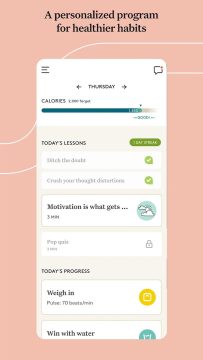

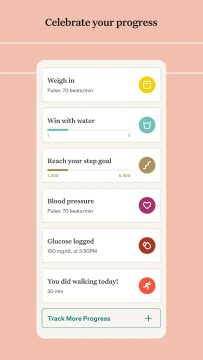

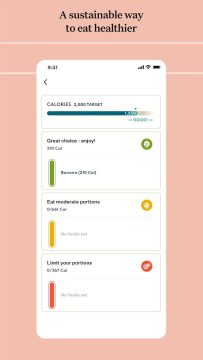
Pros
Cons
Ranks #2 out of 40 fasting apps
App rating
DoFasting stands out as one of the best fasting apps currently available, serving as a comprehensive guide through your weight loss journey. This app carefully steers you through every stage of the process, providing support and guidance tailored to your unique needs. Thanks to its personalized approach, you can have peace of mind knowing the plan considers your body type and specific requirements, which is determined by an initial quiz, making your journey entirely customized.
The brilliance of DoFasting lies in its vast library of fasting plans, all designed with expert knowledge. Whether you're an intermittent fasting devotee or you're more inclined towards alternate-day fasting, DoFasting ensures there's a fitting path for everyone. It's a rare find in the realm of fasting apps, where almost every fasting technique is under one roof. That's why we wholeheartedly recommend DoFasting - for its user-centric design, its breadth of fasting plans, and its commitment to helping you find the most beneficial fasting strategy
Limited Time Offer! Avail a 7-day risk-free trial for just $1.00 when you use our DoFasting link. Additionally, DoFasting offers a 14-Day Money Back Guarantee if you don’t see results, giving you peace of mind as you invest in your health.
This is How Dofasting App Looks Like
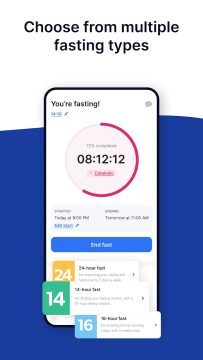

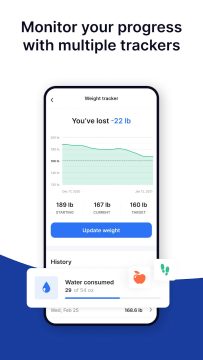
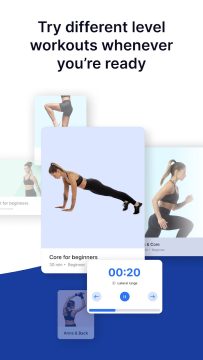
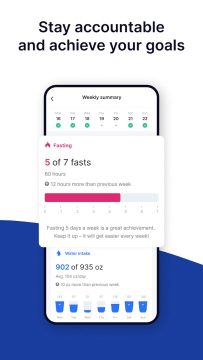
Pros
Cons
Ranks #3 out of 40 fasting apps
App rating
Reverse Health stands out as the top choice for women, offering a 12-week program that extends beyond intermittent fasting to cover nutrition and exercise insights. With its premium subscription, users get a personalized meal plan and a 20-minute daily exercise routine, despite some feedback on the plan's restrictiveness and complex recipes. The app also connects you with health coaches, dietitians, and a supportive community, enhancing the journey towards your health goals.
The app provides three premium subscription options: $28.99 for one month, $58.99 for three months, and $68.99 for six months, without a free trial. Available on both iOS and Android, Reverse Health is tailored for specific health goals, including workout routines and a hydration tracker.
This is How Reverse Health App Looks Like

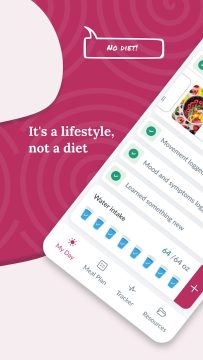

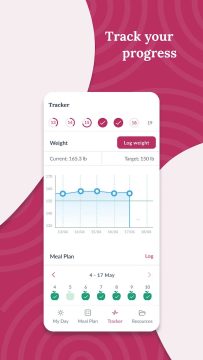
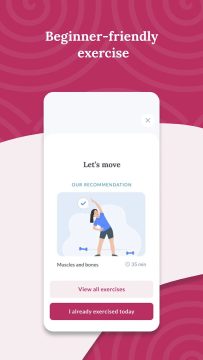

Pros
Cons
APP RATING
4. LASTA APP
Lasta, crafted by a team of expert fitness coaches, nutritionists, and psychologists, stands out as a comprehensive health and wellness platform. Its intuitive and user-friendly interface simplifies the tracking of fasts, water intake, and physical activity, making it an accessible tool for anyone on a health-conscious journey. The app's unique blend of intermittent fasting support, mental health resources, and personalized guidance sets it apart, offering a holistic approach to wellness.
What truly distinguishes Lasta is its integration of Cognitive Behavioral Therapy (CBT) and meditation resources, addressing both physical and mental well-being. This commitment to a multifaceted approach to health, combined with educational content and daily affirmations, positions Lasta as a unique and valuable resource in the health app landscape. Despite some limitations, such as not including all courses in the subscription and lacking calorie tracking, Lasta's comprehensive features make it a standout choice for enhancing overall health and wellness.
Starting from $12.99 per month, it's an affordable and good value option for those looking to dive into a healthier lifestyle.
App RATING
Zero Longevity earns its spot as a top-tier fasting program, offering high-quality content and practical step-by-step instructional videos that justifies its value. One standout feature is the fast-tracking timer, making it effortless to monitor your fasting periods and eating windows. It offers an at-a-glance view of your progress, supplemented by a comprehensive statistics section that delivers an encouraging visual representation of your journey.
Perhaps the most valuable feature of Zero Longevity is the unique opportunity it provides for direct contact with a panel of experts. The ability to pose questions and receive personalized responses elevates the program's support system, helping users overcome any potential hurdles. Combined with advanced analytics that detail your body's responses to fasting, Zero Longevity empowers you with knowledge and understanding to make the most of your fasting journey.
App RATING
6. Fastic App
Fastic, a product of an experienced team, stands as a harmonious blend of modern design and comprehensive fasting strategies, ranking fifth on our list. This beautifully crafted app adds a touch of delight and simplicity to your fasting journey, while offering a meticulously devised program and features that make fasting accessible to everyone.
What sets Fastic apart from many of its counterparts is the unmatched educational resources it offers. The highlight of our review was Fastic's academy – an initiative that breaks down the complexities of intermittent fasting into digestible information. It creates an understanding of the effects fasting has on your body and elucidates the reasons behind its health benefits. This comprehensive approach to education truly sets Fastic apart in the landscape of fasting apps.
App RATING
7. BodyFast App
BodyFast, ranking sixth in our list, stands out for its extensive personalization, delivering one of the most bespoke fasting experiences on the app market. Throughout our review, we were continually impressed by the depth of customization available. The app tailors your fasting week to a degree unparalleled by others, ensuring the plans you embark on align seamlessly with your lifestyle and objectives. If you value a fasting plan designed specifically for you, BodyFast delivers that in spades.
App RATING
Life Fasting Tracker, securing the seventh spot in our rankings, truly excels in its community aspect. Users can engage, share progress, and forge connections within the intermittent fasting community, fostering a sense of unity and shared experience. In using Life Fasting Tracker, you're joining a supportive network that accompanies you throughout your journey.
While the tools offered may be standard, they are effective and serve their purpose well. Although there may be apps that offer more extensive toolkits, Life Fasting Tracker still provides plenty of valuable information and practical guides to assist you in your intermittent fasting routine. The stats presented are easy to digest and prove valuable in tracking your body's progress. If you're seeking a fasting app with a strong community focus, Life Fasting Tracker is a top contender.
APP RATING
MyFast Tracker, landing eight in our rankings, is a remarkable fasting app serving as an ideal companion throughout your fasting journey. Equipped with essential features like a fasting timer and an intuitively crafted weekly schedule, this app provides all the tools necessary for success. During our review, we were struck by the app's unique individuality, tailored to meet specific needs not typically catered to by other apps. For a bespoke fasting experience with a personal touch, MyFast Tracker is a standout choice.
10. Fastyle Tracker
App RATING
Fastyle Intermittent Fasting Tracker, our ninth pick, offers an impressive array of content that ranges from a basic time tracker to professional online coaching. Fastyle equips you with a plethora of tools designed to make intermittent fasting achievable. The creators of Fastyle have clearly put thoughtful consideration into each aspect of the app, providing a treasure trove of information and extensive support to guide you through your fasting journey.
One aspect that could use improvement is the dietary guidelines section, which contains some outdated information that occasionally conflicts with advice from the personal coaches, leading to potential confusion during eating periods. Aside from this minor hiccup, Fastyle stands as a largely positive offering, providing affordable access to quality tools and content to simplify your intermittent fasting experience.
Our Experts Have Tested 40 FASTING APPS
We have tested and rated all major intermittent fasting applications to help you make better buying decisions. See how we test here.
Join Our Family
Join our family to get the latest deals and tips about newest fasting apps!
TLDR
What to Consider When Choosing Fasting Apps?
There are a lot of different fasting apps on the market, so it can be difficult to know what to consider when you’re trying to narrow down your options. Here are some questions you can ask yourself to help you choose.
What’s my budget? There are free apps available, but most of the best features are locked behind a paywall. You get what you pay for, so they’re worth the investment, but it’s important to set your budget before you drill down deeper so you’re not disappointed.
Is there a certain plan I want to stick to? Most fasting apps let you choose which type of intermittent fasting you will do. However, if you’re looking for a highly specialized type of fasting or diet, you’ll want to check if it’s available in the app.
What features do I plan on using? Timers and food and water logs are standard in most fasting apps, but if you’re looking for active social communities, recipes, coaches, and more, you’ll need to investigate a bit more. Each app offers different features, and some are more active than others.
The best fasting app is going to be one that meets your needs, so don’t get distracted by the bells and whistles.
How We Tested Fasting Apps?
We tested each of the apps and websites listed on Fastingapps.com to make sure they’re really the best of the best. We evaluated them using a strict and fair review process, considering many different categories and criteria.
Our steps include:
Checking through the app, noting all the features that are available. We check both the free and the paid version, so you understand what resources are available to you at different price points.
Evaluating the price, comparing the features available to get a better sense of the value.
Cross-referencing other reviews, comparing to see if we missed anything, if features are no longer available, and to see if anything changed to have the most comprehensive reviews available.
Contacting customer service to understand the ease of troubleshooting, including testing the email, chat, and phone assistance where applicable.
Testing ease of use because an app with great features is only worthwhile if you can actually use it. Otherwise, it will just sit there, taking up space on your phone.
At the end of the day, we want to be the one-stop shop for all things fasting apps. Everything undergoes comprehensive testing, so you don’t have to stress about picking the right app for you.
Conclusion
Each app on our list is made well and designed to make the fasting process simple. While there might not be a clear winner among the fasting apps we listed, our team certainly does have some favorites. Before getting into how we organized our list, we do have to offer this tip: Our list is based on what features we felt made a high-quality fasting app. For us, DoFasting was number one but for you, that could have been some other app.
Each app on our list is well worth your time. Just because it ranked low on our list doesn't mean it isn't an amazing fasting app. Every app on our list went through a rigorous review process and was determined to be one of the best available.
So with that being said, our favorite app was DoFasting thanks to the custom experience they offer their users. Their plans, meals, and routines are all based on you and what you're looking for. Again, it's impossible to say that DoFasting is the best overall for everyone, but it was certainly the one that worked best for our review team.
Best Intermittent Fasting Apps Summary
App | Operating System | Rating | Header |
|---|---|---|---|
| |||
| |||
| |||
| |||
| |||
| |||
| |||
| |||
| |||
|
FREQUENTLY ASKED QUESTIONS
 What is the best fasting app?
What is the best fasting app?
While there are tons of fantastic fasting apps available online, we have compiled a list of our 10 favorite fasting apps. Each of these 10 apps offer quality, support, and knowledge as you begin your intermittent fasting journey.
 How do fasting apps work?
How do fasting apps work?
Many fasting apps will start with a quiz or a questionnaire to get to know you and your goals. This quiz enables them to get a solid, custom plan started for you, but that’s just the beginning.
 Which fasting app is free?
Which fasting app is free?
There are tons of fasting apps that offer a free version of their services. Typically, these free apps withhold much of what they have to offer under a paywall. Our list features a couple fasting apps that offer a free version or trial.
 What is the most popular fasting app?
What is the most popular fasting app?
Our list of the 10 best fasting apps features some of the most popular fasting apps around. With anywhere from 500,000 to 5,000,000 downloads and users, we ensure that you have a fasting community to choose from.
Written By Andrew Brewer
Andrew Brewer started FastingApps to give people the guidance that he never received when he was first starting. His goal is to make your goals achievable and to offer you only the best fasting apps that the internet has to offer. You're not on your own - Andrew and the entire family of reviewers at FastingApps are here with you every step of the way!
We may earn commissions when you purchase apps through our links to external sources. Read our affiliate disclosure here.








 What is the best fasting app?
What is the best fasting app?